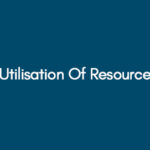
What is Resource Utilization and How Does It Work | A Practical Example
December 21, 2020
Use of Building Information Modeling (BIM) in Construction Industry | A Study with Engineering Perspective
December 21, 2020Project management plays a vital role in turning ideas into reality by organizing tasks and resources efficiently. It ensures projects stay on track, meet goals, and navigate challenges effectively, serving as the compass that guides successful endeavors. Project management is like being the captain of a ship. It's a process where you plan, organize, and guide a team to complete a specific task or project on time and within the set goals and budget. The current paper is inquiring about the significance of project management by posing some important questions below.
Q1. What are the main reasons the author advances for project management to be considered an “accidental profession”? The 12 guidelines are presented in no particular order. Order them by the level of importance and explain your reasoning.
Project management is an entirely different area of business in which the researcher observed that project managers are not fully aware of their real responsibilities. Although it is true that project managers are key to success, they are not the only reason for success. It is suggested in the literature that project managers should perform as a leader rather than as a boss only.
Review Why Project Management is Referred as a Accidental Profession
These fundamental factors put some obligations on the field of project management. Project management is referred to as an accidental profession by many authors. In the current paper, the author highlighted two major reasons that support project management to be an accidental profession. These two reasons are described below (Pinto and Kharbanda, 1995)
- There are only a few training programs for project managers. It has been observed that project managers are trained with ad hoc practices rather than following any systematic program. So as a result, they learn about their responsibilities randomly in the field of work without following a planned strategy.
- It has been investigated that in most cases, the designation of a project manager is based on the requirements of the company. Companies do not consider those individuals capable of managing projects which only wish to be sole project managers without having to assume any other responsibilities.
Following are some guidelines that are significantly important for a project manager. These guidelines are described below with respect to their priority level.
1. Understand the Context of Project Management
It is considered the most critical factor at the top priority level because it is critical to developing an understanding of project management. Successful project delivery is very important for any organisation as these building blocks increase the visibility of the organisation in the corporate world. A project manager needs to be fully aware of the project scope/context along with organisational influences in managing that project. Once project managers have developed the basic knowledge of project management, they can better understand their responsibilities and organisation needs.
2. Understand Who the Stakeholders are and What They Want
Stakeholders are those whose interest is involved in the success of any project. Stakeholders are different from each other, and it is the responsibility of the project manager to understand the requirements of stakeholders at the beginning of the project. As it might not be possible to make all the stakeholders happy simultaneously, the project manager is required to develop a successful relationship with all stakeholders.
3. Understand What “Success Means
Success is a broad term that has multiple dimensions. Success is not only considered in terms of the project but also about stakeholders' satisfaction. It is evident if the outcome of a project is not according to the expectations of stakeholders, then no matter what is built, all efforts can be considered useless. Therefore, a project manager needs to understand all dimensions of success to bring overall success.
4. Above All, Plan, Plan, Plan
Once a complete understanding of the project and its requirements have been established, planning is the next critical factor. It is believed that appropriate planning brings success. Ad hoc development without any pre-planned activities does not produce positive results. A project manager needs to be capable of developing such plans, which can boost development and produce a worthy outcome.
5. Use time Carefully, or It will Use You
Time management is listed as another critical factor which has never been addressed carefully. Generally, time management is perceived as completing all development activities within schedule. In reality, a project manager can usually waste his/her time in meetings and personal discussions. It is significantly important for a project manager to make effective use of time not only in his personal activities but also in project activities.
6. Remember What You are Trying to Do
Every project has an objective that must be shared with the team as well. Usually, it is assumed that knowing about the project goals is in the interest of project managers only, but it is not true. Defining a project goal and explaining it to team members is a motivational factor for team building. It also reminds a project manager of what he actually needs to do. A review of targets, goals and objectives on periodic bases can help the managers to ensure that the project moves along as per the plans.
7. Build and Maintain a Cohesive Team
The team plays an imperative role in the success of any project. A team is not meant to be a group of people only. It is a group of people who share a common goal. Therefore, it is the responsibility of the project manager to formulate a successful team which works together to achieve a single objective and deliver a successful project.
8. Recognise Project Team Conflict as Progress
The capabilities of a project manager can manage conflict management. When a team includes people from multiple backgrounds and teams involved in various activities, conflicts can easily arise that could be personal or opinion. A trained project manager first understands the nature of the conflict and then takes action to resolve it. Periodic reviewing project activities and sharing / transforming pivotal information across all teams have been considered good practices.
9. Enthusiasm and Despair are both Infectious
Team members are dependent on the behaviour of project managers. They predict good and bad happenings from the attitude of the project manager. If everything goes fine project manager seems happy. If not, he might be aggressive. In both cases, the attitude of the project manager matters a lot for the team members as well for the success of the project, as they can take decisions that are not based on the facts and as per the requirements of the project. A project manager should keep a balance so that his influence does not negatively affect the project or the team.
10. One Look Forward is Worth Two Faces Back
In general, all activities are planned according to the requirements of the project and the stakeholders, as it is a critical success factor for project management. Mostly, stakeholders do not know about technology drift or could not estimate how frequently demands could be changed. A successful project manager always thinks about the project in two ways. One is positive thinking, and the other is critical thinking. If a project manager thinks critically, he can efficiently work with future challenges. If any changes are required, they must look forward and always be keen to optimise the processes involved in completing the project. Looking back may waste precious project time and result in additional cost, a major project risk.
11. Lead from the Front; the View is Better
Another important project management practice is taking the lead in managing communication and coordination. A project manager is a key person who is involved in the communication not only within the team but with external stakeholders as well. He is fully aware of the strengths and weaknesses of his subordinates. Therefore, effective project management implies that the project manager should lead from the front and adopt a transparent leadership strategy to motivate his team.
12. Accept and Use the Political Nature of Organisations
The last but not the least factor for project management is managing Politics between various departments of organisations. All managerial decisions are affected by political pressure, which could be in different forms. A good project manager copes with politics and makes effective plans to minimise its effect on the development processes.
Q2. A few of the guidelines are related to the need to understand the reason for the project in the first place. Which guidelines would you place in this category? Why is this important? You need to explain your reasoning.
Focusing on the most important rules to understand the project better.
- Develop an understanding of the primary objectives of the project at the most fundamental levels. Recognising these objectives is considered as most important in this category as this can provide a sustainable pathway for the management to be followed for a successful delivery
- Develop a comprehensive understanding of the project and the requirements of all the stakeholders. This may also include the roles of the teams involved in the project. This is required so that management can draft an execution plan for the project
- Develop an understanding of the activities to be involved in for the successful completion of the project. This is required for human resource management as well as to ensure that all teams are on the right path
- Remember what you are trying to do. This is required to be focused on successful project delivery
Project Management is all about the projects and the client’s requirements, which are developed while ensuring that project objectives are successfully met. So understanding the reason for the project at the most fundamental level assists in determining the goals and objectives of the project being undertaken. In addition, it is imperative to stay on objectives so all activities can be carried out sequentially.
Q3. In lesson 9, why is always thinking about “what if” so important? You need to explain your reasoning.
“What if” is ever so important as it questions the path followed in any project or activity. This asks the simple question, what if something happens along the way. This is also very important for engineers as well as project managers, and this is the methodology followed when the practitioners undertake the project risk assessment. The project is analysed for all the parameters involved, and what if scenarios are applied, which helps in drafting possible project risks. A strategy is then devised to ensure that all these project risks are mitigated in order to ensure that the projects are delivered in accordance with their requirements.
Assess the Prerequisites that Led to the Development of the Project
Moreover, every project is developed because of requirements which are given by stakeholders. A successful project is that which is accepted by its stakeholders. This is the present state of the project that is being developed. Needs are evolved over time. Things that are acceptable today might not be accepted after five or ten years. Future planning on what scenarios should always be part of the project planning. Looking into the various future challenges is always helpful in developing sustainable projects. Therefore, it is worthy of thinking in two dimensions. First is what is happening, and second is what will happen if the situation is reversed. This critical thinking facilitates project managers to make plans for the future, and ultimately, this factor incorporates long-lasting success for any organisation.
References
Pinto, J. and Kharbanda, O. (1995). Lessons for an accidental profession. Business Horizons, 38(2), pp.41-50.
Get 3+ Free Dissertation Topics within 24 hours?




























